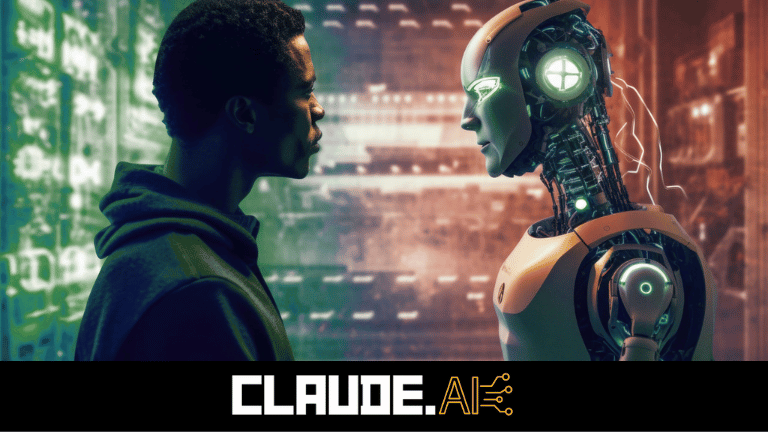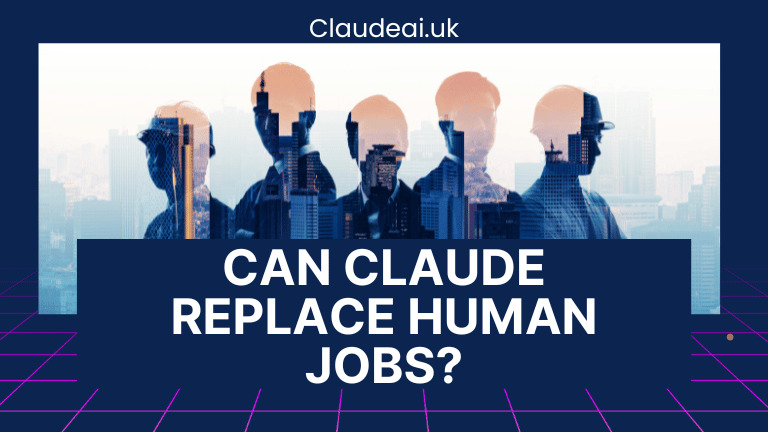Can Claude replace human jobs? The capabilities of artificial intelligence (AI) systems like Claude are advancing rapidly, leading many to wonder – can this technology replace human workers? It’s an important question to consider as AI assistants and chatbots handle more complex tasks. This article explores the current abilities of AI, where it still falls short, the types of jobs potentially at risk, and how workforce disruption may unfold.
What Can Claude and Other AI Assistants Do?
Systems like Claude showcase the impressive progress of natural language processing. Unlike earlier chatbots, Claude can understand context and nuance in written conversations. It answers open-ended questions, summarizes long articles, analyzes data sets, generates novel text on prescribed topics, translates languages, and more.
While not perfect, its abilities indicate AI can match or outperform humans on certain discrete tasks involving language processing, data analysis, information retrieval, and even basic creativity within defined bounds.
Where Do AI Assistants Still Fall Short?
However, Claude AI has clear limitations. Its knowledge comes from training datasets, not lived experience. It lacks senses, emotions, and advanced reasoning abilities. As a result, its skills focus narrowly on language and logic-based tasks. It cannot yet demonstrate general intelligence rivaling humans.
Specifically, Claude struggles with common sense reasoning, comprehending personal feelings and motives, applying broad knowledge to make connections “on the fly”, innovating ideas or solutions, exhibiting personality or emotion, carrying on unscripted conversations, and handling complex multistep processes.
While AI systems keep advancing, human strengths like emotional intelligence, ethics, abstraction, judgment calls, and strategy set us apart for the foreseeable future. AI cannot replace human ingenuity just yet.
What Jobs Could Potentially Be Impacted?
Keeping the limitations in mind, AI systems could still impact many jobs focusing on structured data analysis, standardized communications, and routine information processing.
Roles like data entry clerks, tax preparers, library assistants, legal secretaries, accountants, translators, technical writers, and mortgage brokers deal heavily in data and documents ripe for automation. Sales roles and service jobs could shift toward hybrid AI-human teams. Manufacturing already integrates “collaborative” robots requiring less human input.
However, most skilled professionals in healthcare, sciences, engineering, arts and entertainment, business operations, law, academia, and management rely extensively on capabilities outside of Claude’s scope. While AI affects how these roles operate, it cannot replace them outright. The same applies for tradespeople, construction crews, maintenance and repair technicians, law enforcement, firefighters, chefs and cooks, and more.
In essence, if key job components focus on creativity, custom services, manual dexterity, or the human touch, AI is unlikely to take over meaningfully. The jobs most susceptible have high volumes of repetitive, rules-based tasks. Even so, we have not reached the point where entire professions become obsolete primarily due to AI.
How Might Workforce Disruption Unfold?
While widescale “robot takeovers” remain unrealistic for now, AI could still disrupt portions of the workforce in coming years. It may exacerbate economic inequality since more routine middle-income jobs face the highest risks first.
However, past technological shifts that eliminated certain jobs also created new roles in fields that did not previously exist. The same should happen with AI’s ascent – for example, new jobs training AI systems.
Rather than all-out replacement, working symbiotically alongside AI assistants may become the norm. Together, the strengths of humans and machine intelligence could drive newfound productivity, innovation, and knowledge discovery – advancing our economy and society overall.
With measured optimism and pragmatism, while proactively addressing workforce impacts, this promising technology can uplift how we work and live rather than destabilize livelihoods. Regular people need not view Claude as a threat but rather an increasingly helpful digital coworker.
The Economic Argument For AI Adoption
Fears persist that widespread adoption of AI and automation technologies will lead to job losses and economic turmoil. However, looking closely at the economics reveals a counterargument. The embrace of transformative new technologies, even if disruptive in the interim, historically creates more prosperity than it destroys.
There are both supply-side and demand-side considerations that lead economists to foresee job growth and broad economic gains from AI adoption:
The Supply Side
- Investment in AI and complementary technologies spurs new startup activity, creating jobs designing, building, deploying, and maintaining these systems. Entirely new occupations emerge surrounding AI.
- Significant investment and productivity gains incentivize business expansion, providing fiscal room for hiring and wage growth. Businesses in technologically accelerated fields see greater demand and revenue with which to hire more workers.
- Workers displaced by automation can develop new skills valued in the AI-powered economy through affordable, accessible training programs by governments and employers. Retraining helps the workforce adapt rather than dwindle.
The Demand Side
- Efficiency gains from AI free up resources to address unmet market and societal needs, expanding the number and types of economic activities needing human talent. New demand generates new employment options.
- New AI-enabled products, services, and solutions lead to growing consumer and business spending in those newly prolific sectors – again necessitating more jobs.
- Broader economic productivity lifts prosperity across the board. Workers have higher real wages with which to purchase more goods and services, circulating that capital to drive job growth via market demand.
Rising inequality presents a countervailing force where prosperity concentrates rather than spreads. Policymakers must account for this through programs to support low-income workers through transitions.
On balance though, embracing innovation creates more new economic activity than it removes by enabling people to shift efforts to ever-higher-value activities. This phenomen has played out repeatedly through history, as with the advent of everything from steam engines to computers. AI represents the latest wave of automation driving progress.
Job Transformation Rather Than Elimination
AI’s economic upside makes job elimination unlikely in many fields. However, the nature of the work people do will inevitably transform. AI handles routine and repetitive tasks while amplifying human strengths.
For example, a writer may rely on AI assistants like Claude for analysis, research and rote information lookup as they focus creative efforts on communicating original perspectives. Engineers user design suggestions from generative AI to spark new thinking but still weigh complex tradeoffs and ethical considerations themselves. Doctors leverage AI as a diagnostic tool providing second opinions and highlighting connections in patient data but still exercise judgment around actual treatment plans.
This job transformation means new skill requirements and changing workplace practices. Smooth transitions require planned change management and worker support. But reframed wisely, it serves to elevate human work rather than undermine livelihoods.
AI Prosperity Depends on Human Stewardship
A final perspective worth touching upon involves not just comparing capabilities between AI and humans but recognizing their interdependence. Claude cannot design, build and maintain itself at this point. Optimizing how AI assistants deliver value requires human insight.
The Hand That Feeds
The current state of artificial intelligence depends wholly on human supervision and stewardship. People clean noisy training data, label examples, make model architecture decisions, integrate and maintain systems, specify end goals, interpret outputs, and handle exceptions. Human thinking scaffolds everything Claude accomplishes.
Without human oversight, flaws go unnoticed and real-world harm emerges rather than benefits. And with time, AI habitsPick Up bad habits from poor human guidance rather than improving.
Responsible AI Adoption
Humanity’s hand in AI development only grows heavier as the capabilities become more formidable. We must wield that responsibility thoughtfully through research probing risks, industry accountability via impact reviews, equitable access for disadvantaged groups, proactive policymaking to incentivize ethical practices, AI literacy to democratize public oversight, defensive cybersecurity, and cooperation between nations and experts worldwide.
By recognizing AI as an amplifier of human choices rather than an independent force, we can target issues of bias, unfairness, deception, and harm early through increased transparency and vigilance long before they manifest at scale. Only the continued guidance of our collective conscience and scientific rigor can enable AI to blossom into a technology representing the best of humanity rather than its worst instincts.
In Summary
Sweeping “AI takeover” narratives make splashy headlines but prove overblown given Claude’s present limitations and promising economic upside. Rather than framing this societally transformative technology as robots rising against people, the responsible path forward lies in compassionate, ethical co-evolution.
Workers in heavily automatable fields do face real risks of displacement from AI adoption. But countervailing market forces and new occupational categories also emerge as history shows. And most roles transform rather than disappear outright, amplified by AI capabilities wisely applied.
By recognizing our role steering this powerful creation down productive paths, side-by-side rather than in contention with machines, we can thoughtfully navigate workforce transitions and realize abundance. But we must tame unchecked capitalism and address the plight of disadvantaged groups through policy foresight to prevent already severe inequality from intensifying.
With prudent planning, worker solidarity, corporate and government accountability, and public debate that moves beyond hype into nuance – we can harness AI for broadly shared prosperity.

FAQs
Can Claude fully replace human jobs right now?
No, Claude has limitations in general intelligence and emotional capabilities that prevent wholesale human replacement across most jobs currently. It can automate narrow tasks but not entire occupations.
What human abilities can Claude not match?
Claude lacks senses, emotion, true consciousness, creativity, judgment calls using broad world knowledge, complex strategic planning, innovating without constraints, comprehending motives and feelings, handling exceptions, and more.
Will Claude take everyone’s jobs?
It is unlikely Claude leads to full human replacement across entire professions in the foreseeable future. Many jobs leverage intrinsically human strengths unlikely to be automated. Rather, certain tasks transform with AI assistance.
What jobs are most susceptible to impacts by Claude?
Jobs focused heavily on routine operational tasks, data processing, rules-based structured analysis, and standardized communications face highest potential disruption. For example, tax prep, paralegals, technical writing.
What types of jobs are safer from Claude capabilities?
Jobs relying critically on senses, dexterity, creativity, problem-solving, lateral thinking, complex communications, emotional intelligence, ethics, or a human touch seem less susceptible overall.
Will Claude increase or reduce prosperity?
Economists argue embracing innovations like AI historically creates more economic activity and consumer surplus than it destroys, benefiting broader prosperity, albeit with transitional workforce disruption.
How might Claude affect the workforce?
Increasing integration of Claude-like AI across business threatens job losses or shifts for certain categories of middle-income work through displacement, but also creates new kinds of jobs around AI development.
Will AI kill more jobs than it creates?
If the past holds, disruptive innovations that automate certain tasks simultaneously give rise to entirely new kinds of work, allowing job markets to grow rather than shrink on the whole. AI appears no different thus far.
What is responsible and ethical AI adoption?
Humans staying intimately involved in AI development, ensuring representativeness of data and models, extensive testing for biases and errors, thoughtful systems engineering, continuous risk monitoring, and regular external audits.
How can businesses embrace Claude ethically?
By taking a responsible approach involving workforce transition support, opt-in policies, bias reviews, limiting use cases to appropriate tasks only, keeping skilled staff involved, and comprehensive model governance.
What changes will workers need to make?
Developing digital literacy, computational skills, emotional intelligence, creativity, and versatility to adapt to working in complementary rather than combative ways with Claude seems essential to stay relevant.
How can policymakers direct positive outcomes?
Government oversight pushing for responsible practices, guarding against predatory impacts on marginalized groups, incentives improving accessibility, proactive programs to retrain vulnerable workers, and multi-stakeholder coordination.
Should AI be regulated?
Reasonable guidelines could help address risks that profit-seeking corporations otherwise neglect, but heavy-handed interventions might also squelch innovation and its economic benefits. The balancing act remains challenging.
What is the path to prosperous coexistence?
With foresight and leadership, AI automation can liberate the workforce for more meaningful contributions while uplifting society’s health, knowledge and productivity – but cultural assimilation and policy support for vulnerable groups prove critical.

